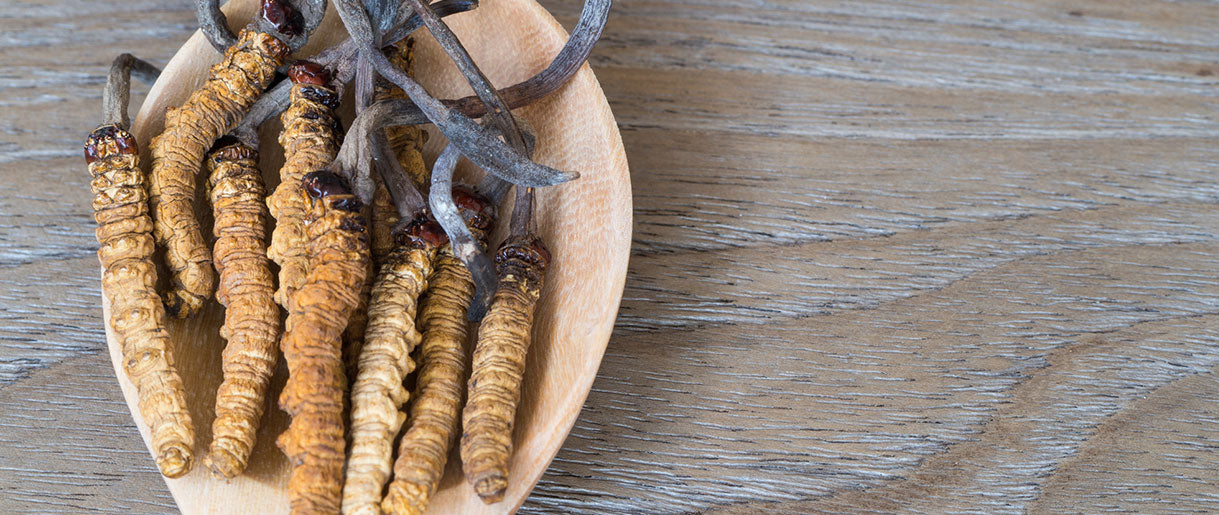Although the use of mushrooms for medicinal purposes is nothing new, research on the efficacy of mushrooms as cancer treatments is still in its early stages. However, a few mushrooms show promise in helping fight cancer—one such mushroom is cordyceps.
Continue reading to learn more about how cordyceps can help treat cancer. This detailed guide also carries evidence that supports the effectiveness of cordyceps mushrooms in managing cancer.
Cordyceps Mushroom: What Is It and What Are Its General Benefits?
Cordyceps is a parasitic fungus that grows on the larvae of insects. These fungi attach to the nymph, replace its tissue, and sprout a long stem outside the larva's body. The mushroom has been used in China and the eastern world for centuries.
Read More: Learn about the use of cordyceps in traditional Chinese medicine.
There are more than 600 species of cordyceps mushrooms. Among them, two species that have become the focus of study are Cordyceps Sinensis and Cordyceps Militaris.
These mushrooms are adaptogens that promote overall well-being. Cordyceps mushrooms are effective in exercise performance, anti-aging, anti-tumor effects, Type 2 Diabetes Mellitus, heart health, and inflammatory conditions.
In this article, however, we will not focus on the other health benefits of cordyceps. Instead, we will explain the use of the cordyceps cancer-treating ability for various types of cancer. We will explain how it works and how to consume the mushroom.
Cordyceps Cancer Effects: Could This Mushroom Hold the Cure To Cancer?

Cordyceps cancer treatment effect has been the significant focus of research studies. Interestingly, researchers have gained some promising results in recent years.
Cordycepin is a bioactive compound found in the cordyceps mushroom. The nucleotide provides various anticancer properties by causing the death of tumor cells and preventing metastasis of tumor cells from one site to another(1).
The bioactive compound is so effective that Oxford University researchers have collaborated with a biopharmaceutical company (NuCana) to develop a novel chemotherapeutic drug using cordycepin.
Early results of the study have shown promising signs of anticancer properties of the drug. Also, studies have shown that the cordyceps mushroom effectively reduces the side effects associated with chemotherapy.
Let us discuss how cordyceps mushrooms are effective in the treatment of various types of cancer.
1. Cordyceps And Breast Cancer
Cordyceps mushrooms inhibit breast cancer growth. Research has shown that the tumor-suppressing activity of cordyceps mushrooms is related to the activation of the NF-κB signaling pathway, promoting macrophage polarization(2).
Furthermore, Cordyceps is effective in the prevention of breast cancer.
Thus, according to the studies conducted in the animal model, Cordyceps cancer treatment effect for breast cancer is assured. However, further research on the human model is required to recommend therapeutic use.
2. Cordyceps And Prostate Cancer
The cordycepin in cordyceps mushrooms effectively induces apoptosis in human prostate cells. This suggests that cordycepin can act as a potential chemotherapeutic agent for the treatment of prostate cancer(3).
Also, cordycepin inhibits the migration and invasion of prostate cancer cells by inhibiting the activity of tight junctions and matrix metalloproteinases(4).
3. Cordyceps And Skin Cancer Cells
A research study suggests the cordycepin extracted from the Cordyceps Sinensis or Militaris causes a dose-dependent inhibitory effect on the proliferation of four cancer cell lines, including melanoma cells (a type of skin cancer), breast cancer cells, liver cancer cells, and leukemia cells.
In addition to treating leukemia and other cancer cells, cordyceps mushrooms have much lower cytotoxic effects on bone marrow cells. So, Cordyceps mushroom effectively treats skin cancer without the severe side effects of conventional chemotherapy(5).
Read More: See how Chaga promotes skin health.
The mechanism by which the cordyceps mushroom causes melanoma cancer cell death is by inhibiting angiogenesis and activating apoptosis of cancer cells.
4. Traditional Chinese Medicine Cordyceps And Lung Cancer
Traditionally, cordyceps mushrooms have been used to enhance lung capacity, but recent studies have been done to study its effect on managing lung cancer.
Read More: Learn how Cordyceps improves overall lung health.
Thecurrent research studies have shown that cordycepin-induced apoptosis may be effective in treating lung cancer, primarily when combined with a chemotherapy drug. The mushroom's anti-tumor effect can keep lung cancer from continued growth.
Studies have shown that the extracts of Cordyceps Militaris decreased cellular proliferation, induced cell cycle arrest, and increased apoptosis of the non-small cancer cell line(6).
Also, combined with other chemotherapeutic agents, polysaccharides extracted from cordyceps mushrooms enhance the therapeutic effect on non-small cell lung cancer(7).
5. Cordyceps And Human Colorectal Carcinoma Cells
Colorectal cancer is gastric cancer affecting the rectum or the colon. Most cases begin as non-cancerous polyps.
While the treatment for colorectal cancer largely depends on the tumor's location and size, research has shown that people can leverage the benefits of Cordyceps on colorectal cancer.
Read More: See how Cordyceps keeps patients energetic while dealing with colorectal cancer.
A research study conducted in 2015(8) determined that cordyceps Militaris can help treat colorectal cancer. The research study treated colorectal cancer cells with varying concentrations of cordyceps ethanol extracts for 48 hours.
The cytotoxicity of the mushroom on the cordyceps Militaris was measured. The results showed that the growth of the tumor in the xenograft model was suppressed by the ethanol extract of Cordyceps militaris, which was highly cytotoxic to human colorectal cancer RKO cells. Cordyceps militaris' anti-tumor activity was linked to cell cycle arrest and mitochondrial-mediated apoptosis induction.
6. Cordyceps And Ovarian Cancer Cells
Researchers conducted a study in 2020(9) to determine whether cordyceps could help reduce ovarian cancer tumor growth. Researchers analyzed the effect of cordyceps militaris on the proliferation of cancer cells by confirming viability, migration assay, and morphological changes.
After analyzing the results, the researchers determined that C. militaris suppressed ovarian cancer cell growth, survival, and migration, possibly via coordinating TNF-/TNFR1 signaling and NF-B activation. According to the researchers, when seen as a whole, the findings from the study offer fresh insight into a cutting-edge Cordyceps militaris therapy approach for ovarian cancer.
7. Cordyceps And Human Bladder Cancer Cells
The anticancer effects of cordyceps play a critical role in treating bladder cancer. The mushroom showed that it could help with bladder cancer therapy in a research study conducted in 2017.
In the 2017 research study(10), Human T24 bladder carcinoma cells were treated with Cordyceps militaris hot water extracts containing cordycepin. Researchers discovered that this treatment reduced T24 cell survival in a dose-dependent manner. This effect appeared to be mediated by the activation of the A3 adenosine receptor and the subsequent inactivation of Akt pathways, which increased cleaved Caspase-3 and apoptosis.
8. Cordyceps Helps With Inflammation Treatment
Research has linked inflammatory diseases with cancer. A research study published in 2019(11) determined that if the underlying cause of the inflammation doesn't go away or specific control systems meant to stop the process from continuing fail, the inflammation may become chronic. Chronic inflammatory responses can lead to cell proliferation and mutation, frequently fostering the conditions for cancer growth.
Cordyceps mushrooms carry antioxidants that fight free radicals—this reduces the risk of suffering from inflammation that often ends up creating an environment conducive to the growth of cancer cells. By fighting the underlying causes of inflammation, the traditional Chinese medicine cordyceps indirectly helps fight cancer.
Interesting Read: What is the best time to take Cordyceps?
Cordyceps And Conventional Cancer Treatment Methods

Chemotherapy can lead to various side effects in a patient undergoing cancer treatment. Using cordyceps mushrooms not only helps treat cancer but also helps offset the symptoms associated with chemotherapy. The mushroom helps with immune system activation, allowing the body to fight against the impacts of chemotherapy.
The mushroom most likely helps by protecting the stem cells in the bone marrow from the cytotoxic effects of chemotherapy. This maintains the immunity in patients receiving chemotherapy and thus prevents frequent infections and other cytotoxicity-related symptoms.
What Are The Risks Involved?
Cordyceps mushroom is generally considered safe and is well tolerated for consumption, with minimal side effects reported. However, there are certain situations in which you should be careful.
- If you are allergic to other mushrooms, yeast, molds, fungi, or their products
- If you are diagnosed with any bleeding disorders
- Few weeks before and after any surgeries
- If you are pregnant or planning to have babies
You need to consult your healthcare provider in the situations mentioned above.
Read More: Does cordyceps have any dangers?
Taking Cordyceps Mushrooms
You can take cordyceps mushrooms as part of your regular diet for their nutritious value. Moreover, you can take the supplements available for different health benefits and therapeutic reasons. However, it's always better to take supplements after consulting your healthcare provider.
Read More: Can you take cordyceps before bed?
FAQs About Cordyceps Cancer Benefits
Cordyceps Cost
Cordyceps mushrooms have a cost as high as 9000 USD per pound. However, with synthetic cordyceps products on the market, you do not have to worry about spending all this money.
Synthetic cordyceps mushrooms are lab grown but deliver the same results as actual mushrooms. However, lab-grown cordyceps mushrooms are much more affordable.
To ensure good quality, you must look for brands that carry the United States Pharmacopeia (USP) or NSF International (NSF) seal.
Cordyceps Dosage
Although scientists have not discovered the exact cordyceps dosage for cancer, 1000-3000 mg daily of cordyceps supplements is effective with minimal side effects.
Is Cordyceps Good For Cancer Patients?
Yes, cordyceps is beneficial in cancer patients. It reduces cancer size and reduces the side effects associated with chemotherapy. However, further study in human subjects is required for its therapeutic recommendation.
Can Cordyceps Cause Cancer?
Cordyceps is not associated with causing cancer. In contrast, it helps in the prevention of cancer.
Is Cordyceps Good For Breast Cancer?
Various animal studies have shown that cordyceps is beneficial for reducing the tumor size of breast cancer. The mushroom also prevents breast cancer.
Key Takeaways
Research shows that cordyceps mushroom effectively treats various cancers, including breast, prostate, skin, and lung. However, we need more human studies to recommend cordyceps mushrooms as an independent treatment.
If you're interested in trying this natural remedy, speak with your doctor about adding cordyceps supplements to your treatment plan. Your doctor will help you figure out an ideal dosage.
Have you used cordyceps mushrooms before for any health condition? Let us know how you've used cordyceps mushrooms to improve your health in the comments below!
References
- The Anticancer Properties of Cordycepin and Their Underlying Mechanisms. (1)https://www.mdpi.com/1422-0067/19/10/3027
- Extracts of Cordyceps sinensis inhibit breast cancer growth through promoting M1 macrophage polarization via NF-κB pathway activation, (2)https://www.sciencedirect.com/science/article/abs/pii/S0378874120308370
- Apoptosis induction of human prostate carcinoma cells by cordycepin through reactive oxygen species-mediated mitochondrial death pathway, (3)https://www.spandidos-publications.com/10.3892/ijo.2013.1762?elq=1ffa1af5573d46a9abb6a12b7ca25607
- Inhibition of migration and invasion of LNCaP human prostate carcinoma cells by cordycepin through inactivation of Akt, (4)https://www.spandidos-publications.com/10.3892/ijo.2012.1332
- Inhibitory effects of ethyl acetate extract of Cordyceps sinensis mycelium on various cancer cells in culture and B16 melanoma in C57BL/6 mice, (5)https://www.sciencedirect.com/science/article/abs/pii/S0944711305002461
- Cordyceps militaris (L.) Link Fruiting Body Reduces the Growth of a Non-Small Cell Lung Cancer Cell Line by Increasing Cellular Levels of p53 and p21, (6)https://www.mdpi.com/1420-3049/20/8/13927
- Polysaccharide of Cordyceps sinensis Enhances Cisplatin Cytotoxicity in Non–Small Cell Lung Cancer H157 Cell Line, (7)https://pubmed.ncbi.nlm.nih.gov/21382957/
- Anticancer effect of Cordyceps militaris in human colorectal carcinoma RKO cells via cell cycle arrest and mitochondrial apoptosis, (8)https://pubmed.ncbi.nlm.nih.gov/26141646/
- Cordyceps militaris induces apoptosis in ovarian cancer cells through TNF-α/TNFR1-mediated inhibition of NF-κB phosphorylation, (9)https://bmccomplementmedtherapies.biomedcentral.com/articles/10.1186/s12906-019-2780-5
- Cordycepin induces apoptosis in human bladder cancer cells via activation of A3 adenosine receptors, (10)https://pubmed.ncbi.nlm.nih.gov/28714368/
- Inflammation and Cancer, (11)https://www.ncbi.nlm.nih.gov/pmc/articles/PMC6704802/









Let Us Know Your Comments